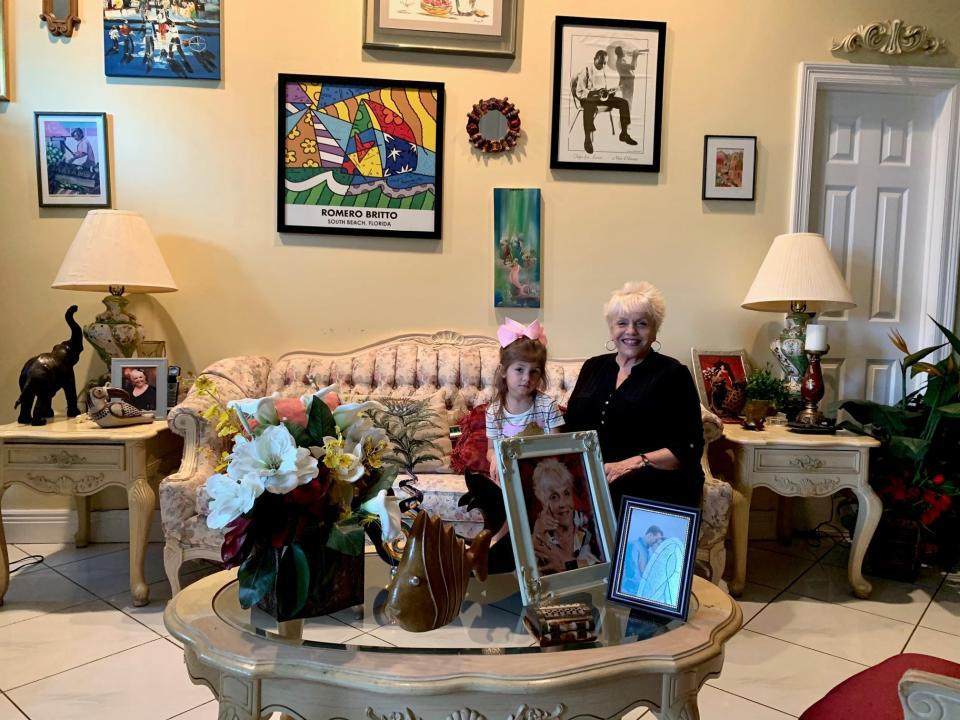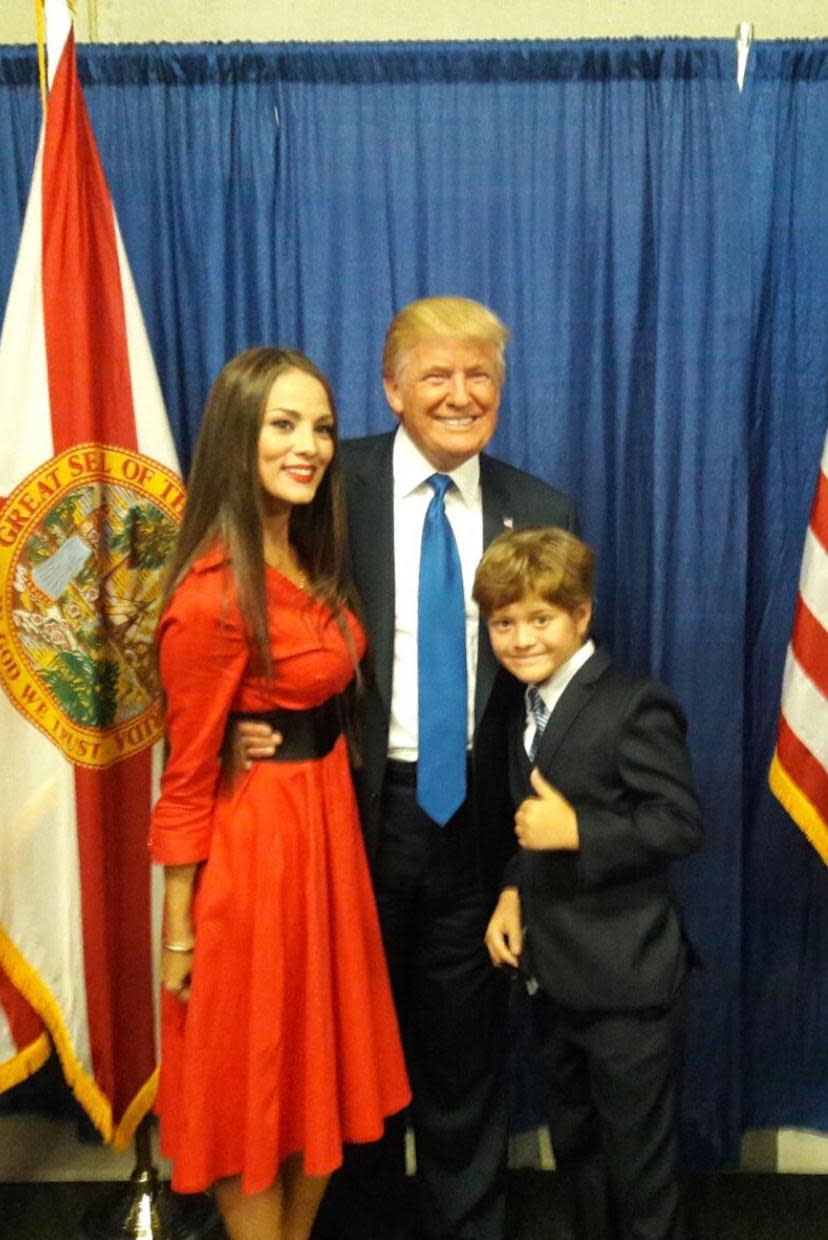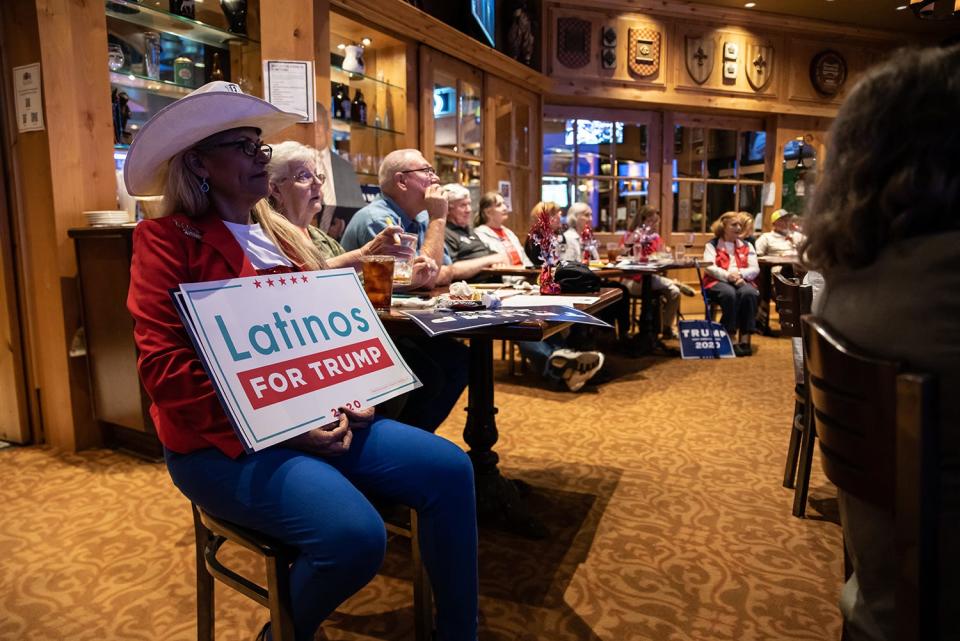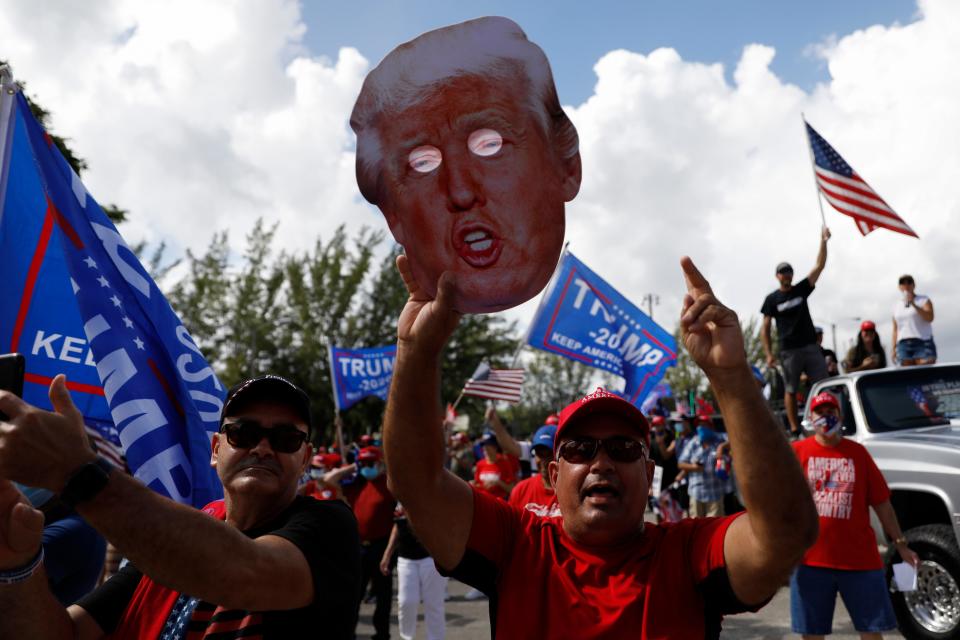Latino voters who fled dictatorships fear election was stolen from President Trump
- Oops!Something went wrong.Please try again later.
MIAMI – Two years after Fidel Castro’s takeover of Cuba in 1959, Margarita De Castro was in trouble.
The communist government was imposing its will across the island, and picketers demanded the young telephone operator face a firing squad after she was accused of setting fire to Havana’s largest department store. Terrified, she snuck out of her job at the telephone company where protesters were gathered and called her father, who paid $8,000 for someone to forge the date on her expired passport. She fetched some clothes and her diamond ring from an armoire in her home, kissed her newborn son goodbye and boarded a flight to Miami.
Alone and penniless, she began her life in the United States, working at a Miami Beach hotel, eventually becoming a banker and raising four sons on her own.
The 79-year-old refugee said her experience in Cuba drove her to become a Republican, voting for the GOP in almost every election since becoming a citizen in 1972. She never seriously felt that communism could follow her to the United States – until the 2020 presidential election.
"I feel like I am living what happened in my country 40 years ago," De Castro said.
For many Americans, the idea of a presidential election devolving into a months-long battle for control of the nation may be unprecedented, but for many Latino supporters of President Donald Trump – many of whom escaped authoritarian regimes themselves – it raises old ghosts. There is no evidence of election fraud, but many fear covert socialists are in cahoots with the media in an attempt to rob a sitting U.S. president of power.
“People used to say Communism can’t happen in Cuba, and look how that turned out,” De Castro said on a recent afternoon as she played with her great-granddaughter in her home in West Miami, a working-class Cuban American enclave in South Florida where the majority of votes were cast for Trump.
De Castro said her big fear is Vice President-elect Kamala Harris. "She's another AOC," she said referring to U.S. Rep. Alexandria Ocasio-Cortez, who has described herself as a Democratic socialist. Harris has generally stopped short of embracing many of the policies championed by the progressive wing of the Democratic Party.

Almost two weeks after the election, Trump is refusing to concede. Instead, he has continued to summon the support of his 73 million voters, soliciting “election defense funds” and mounting an aggressive legal campaign aimed at challenging the results in a handful of states where President-elect Joe Biden holds small but significant leads.
Trump and his supporters have pointed to ballots being cast by dead people, malfunctioning equipment and counting absentee ballots received after Election Day as evidence of their claims. The Department of Homeland Security, however, put out a statement Thursday calling the Nov. 3 election "the most secure in American history."
In Florida, where Biden lost by 375,000 votes, Republicans succeeded in casting the former vice president as a “Trojan horse for socialism," linking Biden to Ocasio-Cortez and Vermont Sen. Bernie Sanders, who was criticized during the Democratic primary for praising Cuba's communist literacy program.
“When you have national Democratic leaders praising Fidel Castro’s indoctrination programs and hailing neo-Marxists as ‘the future of the party,’ it communicated to our community that the Democratic Party does not respect our values,” said Giancarlo Sopo, a Cuban American communication strategist on the Trump campaign. "We simply voted accordingly, as did many other Latinos – like Colombians and Peruvians – who want nothing to do with socialism and the progressive agenda.”
Now, with Trump refusing to accept the election results, many Latino Trump supporters said they feel they are replaying dark chapters of their history.
Trump supporters decry censorship
Carolina Tejera, 44, a soap opera actress, was outraged watching TV channel after channel project Biden as the 46th president of the United States. It wasn’t only CNN and MSNBC that made her livid, Tejera said: “Fox News, too.”
The Venezuelan American flashed back to the moment radical populist Hugo Chavez first won the Venezuelan elections in 1998. The leftist leader relentlessly antagonized the United States while pushing his socialist agenda in the South American country during his 14 years in power.
“When Chavez first won all the channels were ecstatic – they celebrated it on air,” Tejera said. “Newscasters here seemed happier than the American people.”
What really got under Tejera’s skin, however, was news networks' en masse decision to cut off Trump’s Nov. 5 live remarks after he wrongly claimed victory in the election. Trump also claimed, with no evidence, there had been fraud in states that Biden carried by thousands of votes.

USA TODAY was among the outlets that removed the video from its platforms. Editor-in-chief Nicole Carroll explained the reasoning behind the decision, saying the president's remarks were "undermining Americans’ confidence in the democratic process." Instead, USA TODAY published a comprehensive story on the president's speech.
“That’s censorship. It’s the kind of thing you only see in socialist regimes,” said Tejera, who cast her first vote ever in a U.S. election for Trump in 2016. During the 2020 campaign cycle, she traveled across the country to almost a dozen Trump rallies.
“If this country has been the target of terrorist attacks, presidential assassinations, why are people so shocked that there could be voter fraud,” Tejera wrote on her Instagram account, which has more than 362,000 followers. The actress and model regularly shares her pro-Trump views and has recently taken to share purported electoral fraud memes, videos and commentary.
Tejera and other GOP voters have also criticized social media platforms that have flagged the president's tweets as false. In February, Twitter announced it would begin labeling tweets as "manipulated media." Facebook said in May that while it would not perform fact-checking on paid ads, it would remove posts misleading people about the elections. Some of Trump's supporters, including Tejera, also have been targeted by these practices.
Stephen Armas, a Cuban American recruiter for IT companies based in Colorado, said voters should be able to read anything freely and do their own research without interference, saying the "amount of censorship bestowed on Donald Trump is absolutely outrageous."
"I never thought I would see this in the United States of America," said Armas, 31.
He added: "As the son of Cuban immigrants I know all about a political party changing narrative, censoring and pushing their own agenda; and if you disagree, you're silenced."
Disinformation campaigns target Latino voters
Long before Election Day, many Latino voters have received misinformation about the election that has shaped how they view Biden and Trump.
While social media platforms began flagging misleading posts in English earlier this year, a barrage of Spanish-language conspiracy theories targeted Latino voters across battleground states. Those posts went largely unnoticed and remained unflagged until late in the campaign cycle. Claims ranged from supporters of the QAnon conspiracy theory movement trying to take down the president to groups burning down people's homes if they voted for Democratic candidates.
Radio Caracol, a news station in South Florida, aired a 16-minute paid program in August telling listeners the country would "become a dictatorship run by Jews and Blacks" if Biden won the election. The station's executives later apologized.
The barrage of misleading news intensified after Election Day, with posts about widespread fraud becoming more prevalent on social media channels and WhatsApp messaging groups. In the 24 hours after Election Day, disinformation in Spanish eclipsed interference with the Kremlin-backed Russian Internet Agency in 2016, The New York Times reported.
Hosts from various Spanish-language AM radio stations in Miami said the president's allegations should be "thoroughly investigated" and opened up their phone lines, taking calls from Latino voters who largely backed up their concerns with misinformation they received or saw on social media.
"Han hecho trampa," a caller said in Spanish. "They cheated."
"This is a function of the self-curated information silos," said Fernand Amandi, a Florida-based Democratic consultant and pollster. "They are watching television stations listening to radio programs, or going to internet sites which reinforce the fact that (Trump) did win."

Andy Canales, chairman of Latino Texas PAC, which focuses on electing Latinos to public office in Texas, said he has noticed widespread misinformation on the Spanish-language Facebook sites of his parents, who are naturalized citizens from El Salvador. Many Salvadorans fled to the United States as refugees from 1980 to1992 amid the Central American country's civil war between the military-led government and Marxist guerrillas.
Videos touting Trump as “chosen by God” and allegations of widespread voter fraud are constant Facebook posts, Canales said. Canales said he and his friends, who also have immigrant parents, have struggled to counter the misinformation.
“It’s difficult to explain the Electoral College, the proliferation of votes, mail-in ballots. … It’s difficult to explain all of that in Spanish,” he said. “We’re really struggling.”
Trump supporters warn of socialism in US
Although arguably less effective, Democrats also took a page out of the GOP book, casting Trump as a would-be caudillo, or strongman, likening him to Castro, Chavez and Venezuelan President Nicolas Maduro. One ad stated they were all "cut from the same cloth."
Many Cuban American Trump voters, meanwhile, seemed to disregard the fact that Trump hired an attorney in 2008 to register the Trump trademark in Cuba, as reported by the Miami Herald. For decades, the mere mention or attempt to do business in Cuba would have buried any presidential hopeful's attempt to reach the White House.
“That was before he was president of the United States," said U.S. Army Col. Johnny De la Cruz, a top veteran of the Bay of Pigs invasion of 1961 and president of Assault Brigade 2506, the CIA-sponsored group of Cuban exiles that led the effort to overthrow the Cuban leader. "He did what any normal businessman would do."
Joseph Vitriol, a senior researcher at Stony Brook University in New York, said people who lived through autocratic regimes are more prone to hypervigilance.
"In this heightened state, they perceive reality and look for cues of the places they fled," explained Vitriol.

Vitriol, a political psychologist who specializes in conspiracy theories and false news, said the greater risk is misinformation over time. "It's a drip, drip, drip undermining institutions."
Socialism undertones are also playing out as a GOP strategy across all voting blocs, including the Senate runoff race in Georgia. Recently, a video resurfaced of Castro speaking at a church in New York during his 1995 trip to the United States. Georgia Democratic Senate candidate Raphael Warnock worked as the church's youth pastor at the time.
In Miami, public support for the GOP shows no sign of calming down. On Wednesday, the Facebook group Cubans 4 Trump is calling for a "night of prayer for the nation."
Some Trump loyalists, however, have started to call for a smooth democratic transition – whether the president concedes or not.
William Villar, a Cuban American Trump voter who came to the United States at age 5, said he would back the election results as "a dutiful American," saying, "I'm not a Trump-lican, I am a Republican."
Villar, a 26-year-old Navy veteran and Miami resident, said "whoever wants to follow Trump after fraud allegations are dismissed and proper investigations are conducted, want to follow a dictator like Chavez or Fidel."
"You can't stay in power just because you got elected," he said. "That's a dictatorship, not a democracy."
Contributing: Rick Jervis in Texas
This article originally appeared on USA TODAY: Latino Trump voters fear stolen election amid fraud conspiracies

